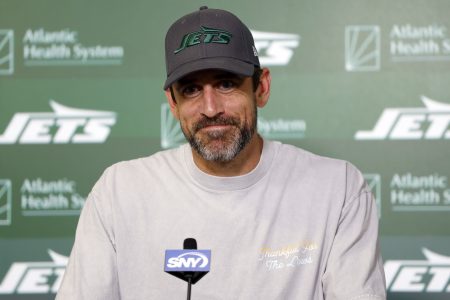The St. Louis Cardinals, embarking on a rebuilding phase, have signaled a potential shift in direction by entertaining the possibility of trading veteran third baseman Nolan Arenado. Initial rumors suggested a broader veteran exodus, including Ryan Helsley and Sonny Gray, but current speculation focuses primarily on Arenado’s departure. The Cardinals’ desire to shed Arenado’s substantial contract, coupled with the player’s reported desire to compete for a championship, appears to be driving the trade discussions. Arenado holds a full no-trade clause, granting him significant control over his destination. Despite the remaining three years and $74 million on his contract, the Cardinals’ willingness to absorb the financial burden could facilitate a trade for a relatively modest return, potentially as minimal as some symbolic compensation.
Two teams have emerged as leading contenders for Arenado’s services: the Los Angeles Dodgers and the Boston Red Sox. The Dodgers, a childhood favorite of Arenado’s, represent an ideal landing spot. Their star-studded lineup and deep pockets would provide the competitive environment Arenado seeks while offering the Cardinals a pool of prospects, primarily pitchers, to build upon. Los Angeles’ ability to assume a significant portion of Arenado’s contract could further reduce the prospect cost for the Cardinals. This scenario presents a mutually beneficial arrangement, fulfilling both the player’s aspirations and the team’s rebuilding objectives.
The Red Sox present an intriguing alternative, albeit with different dynamics at play. Boston’s interest stems from a desire to transition Rafael Devers from third base, potentially opening a spot for Arenado. The Red Sox’s financial resources and robust farm system provide the flexibility to acquire Arenado without significantly depleting their prospect pool. This option offers Arenado a competitive team in the American League East, while providing the Cardinals with a potentially richer prospect return compared to a deal with the Dodgers.
The Cardinals’ motivation in trading Arenado goes beyond mere salary relief. It signals a strategic shift towards rebuilding, prioritizing younger talent and future prospects over immediate competitiveness. By parting ways with a high-profile player like Arenado, the Cardinals create space for younger players to develop and gain valuable major league experience. This short-term sacrifice is intended to lay the foundation for a more sustainable and competitive future.
The trade possibilities surrounding Arenado hinge on several factors. His full no-trade clause gives him the final say, allowing him to veto any deal that doesn’t align with his preferences. The willingness of acquiring teams to absorb a significant portion of his remaining contract will influence the quality and quantity of prospects the Cardinals receive in return. The Dodgers, with their allure of a championship-caliber roster and Arenado’s personal connection, hold a significant advantage, but the Red Sox offer a competitive alternative with potentially higher trade returns.
Ultimately, the Arenado trade saga exemplifies the complex interplay between player aspirations, team strategies, and market dynamics in professional baseball. For Arenado, the opportunity to join a contending team aligns with his competitive drive. For the Cardinals, trading him represents a step towards their long-term rebuilding goals. For the Dodgers and Red Sox, acquiring Arenado offers a chance to bolster their rosters with a proven All-Star talent. The final outcome will depend on the intricate negotiations between the involved parties and Arenado’s ultimate decision.










